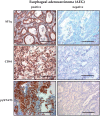The Oncogene AF1Q is Associated with WNT and STAT Signaling and Offers a Novel Independent Prognostic Marker in Patients with Resectable Esophageal Cancer
- PMID: 31671695
- PMCID: PMC6912824
- DOI: 10.3390/cells8111357
The Oncogene AF1Q is Associated with WNT and STAT Signaling and Offers a Novel Independent Prognostic Marker in Patients with Resectable Esophageal Cancer
Erratum in
-
Erratum: Gruber, E.S.; et al. The Oncogene AF1Q is Associated with WNT and STAT Signaling and Offers a Novel Independent Prognostic Marker in Patients with Resectable Esophageal Cancer. Cells 2019, 8, 1357.Cells. 2020 Dec 21;9(12):2724. doi: 10.3390/cells9122724. Cells. 2020. PMID: 33371531 Free PMC article.
Abstract
AF1q impairs survival in hematologic and solid malignancies. AF1q expression is associated with tumor progression, migration, and chemoresistance, and acts as a transcriptional co-activator in WNT and STAT signaling. This study evaluates the role of AF1q in patients with resectable esophageal cancer (EC). A total of 278 patients operated on for esophageal cancer were retrospectively included, and the expression of AF1q, CD44, and pYSTAT3 was analyzed following immunostaining. Quantified data were processed to correlational and survival analysis. In EC patients, an elevated expression of AF1q was associated with CD44 (p = 0.004), and pYSTAT3 (p = 0.0002). High AF1q expression in primary tumors showed high AF1q expression in the corresponding lymph nodes (p= 0.016). AF1q expression was higher after neoadjuvant therapy (p= 0.0002). Patients with AF1q-positive EC relapsed and died earlier compared to patients with AF1q-negative EC (disease-free survival (DFS), p= 0.0005; disease-specific survival (DSS), p= 0.003); in the multivariable Cox regression model, AF1q proved to be an independent prognostic marker (DFS, p= 0.01; DSS, p= 0.03). AF1q is associated with WNT and STAT signaling; it impairs and independently predicts DFS and DSS in patients with resectable EC. The testing of AF1q could facilitate prognosis estimation and provide a possibility of identifying the patients responsive to the therapeutic blockade of its oncogenic downstream targets.
Keywords: AF1Q; MLLT11; STAT; WNT; esophageal cancer; prognosis.
Conflict of interest statement
M.G. has received institutional research support from AstraZeneca, Roche, Novartis, and Pfizer, and has received lecture fees, honoraria for participation on advisory boards, and travel support from Amgen, AstraZeneca, Celgene, EliLilly, Invectys, Pfizer, Nanostring, Novartis, Roche, and Medison. He has served as a consultant for AstraZeneca and EliLilly, and an immediate family member is employed by Sandoz. None of the other authors have financial and personal relationships with individuals or organizations that could inappropriately influence their work.
Figures



References
-
- Strunk C.J., Platzbecker U., Thiede C., Schaich M., Illmer T., Kang Z., Leahy P., Li C., Xie X., Laughlin M.J., et al. Elevated AF1q expression is a poor prognostic marker for adult acute myeloid leukemia patients with normal cytogenetics. Am. J. Hematol. 2009;84:308–309. doi: 10.1002/ajh.21396. - DOI - PubMed
-
- Tse W., Meshinchi S., Alonzo T.A., Stirewalt D.L., Gerbing R.B., Woods W.G., Appelbaum F.R., Radich J.P. Elevated expression of the AF1q gene, an MLL fusion partner, is an independent adverse prognostic factor in pediatric acute myeloid leukemia. Blood. 2004;104:3058–3063. doi: 10.1182/blood-2003-12-4347. - DOI - PubMed
Publication types
MeSH terms
Substances
Grants and funding
LinkOut - more resources
Full Text Sources
Medical
Research Materials
Miscellaneous

